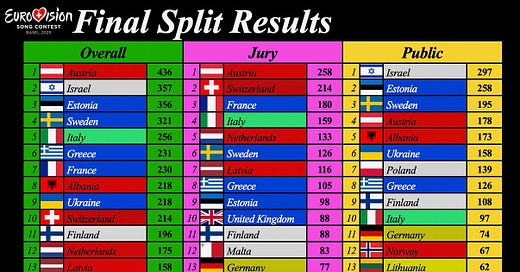Last night, Israel came in second place at the Eurovision song contest and won the public televote by a wide margin. This caused two simultaneous conversations. On one side, did Israel unfairly rig the televote? On the other hand, did the Eurovision Jury sabotage Israel in order to prevent their victory? This essay, a departure from my usual subject matter to be sure, seeks to explore both questions with an eye towards broader lessons that can be learned from the exercise.
Rebutting the Allegations
There are three main claims against Israel deserving their televote victory, many of which are recycled from arguments against Israel’s earning such a high public vote last year. All of them are easily rebutted:
The Israeli/Jewish Diaspora voted en masse for Israel. Given how few Jews there are in the world, and that the vast majority of us live either in Israel (and thus cannot vote for Israel in the competition) or outside of Europe, this claim is so ridiculous that it deserves no response.
The Israeli government sponsored ads to get people who would not otherwise vote in Eurovision to vote for Israel. My limited understanding is that many countries do this in some capacity. My next point will also address this.
How could Israel be so supported given what they are doing to Palestine? It’s generally well understood that a “silent majority” outside of particular progressive areas believe in Israel’s right to defend itself and understand that Hamas’ brutal massacre was what led to today’s situation. Even those who feel that Israel’s response in this particular moment remains too extreme do not believe that an Israeli singer should be harassed, threatened, or attacked for her participation in this competition. Returning to the previous point, attempts to get people to vote only work if those people are willing to vote. The willingness of so many to do so (with or without advertisements encouraging them) shows their dissatisfaction in how Israel is being treated on the world stage.
Did the Jury Sabotage Israel?
To get to the bottom of this question, let’s take a deep dive into the competition and compare the Jury results with the public ones. We’ll take the top five songs on each side as a case study. Here’s a helpful presentation of all the results I found on Facebook:
As we can see, the Jury’s top five included Austria, Switzerland, France, Italy, and the Netherlands. The top four are ballads, and three of these five are either entirely or partially in French. Israel is the only traditional ballad outside of the Jury’s top ten and is the only ballad with French lyrics outside of their top three. Interesting…
The public’s top five, meanwhile, is made up of Israel, Estonia, Sweden, Austria, and Albania. The only country shared by both the public and the Jury is Austria, who won the entire competition. Sweden and Estonia both made it into the Jury’s top ten, but Albania was placed even below Israel from the Jury’s perspective. As far as the rest of the Jury’s top five go, only Italy cracked the public’s top ten. As far as the public was concerned, France came in 14th, the Netherlands in 16th, and Switzerland dead last. This signals a significant disconnect between how the Jury and the public view music outside of any controversy around Israel.
Nonetheless, let’s examine what would have happened had the Jury given Israel more points. Israel presented a well-executed ballad which was sang in three languages (English, French, and Hebrew) yet received only 60 points from the Jury. The next best ballad for the Jury was Greece, in 8th place with 105 points. Had Israel received the same amount of points from the Jury, they would have had a grand total of 402 and would still have come in second place to Austria. Had Israel been given the same amount as the Netherlands (the only of the Jury’s top five that is not a ballad), they would have had 430 and would still have been barely behind Austria.
For the sake of argument, let’s assume the Jury would not have placed Israel higher than that. They historically really like Italian ballads and France, Switzerland, and Austria were all extremely hard to beat from a technical standpoint (or so singers that I know - who are pro-Israel, by the way - claim. I am no expert and defer to their judgement).
I would conclude from there that YES, there is a strong anti-Israel bias from the Eurovision Jury. However, that bias is not necessarily the reason that Israel didn’t win last night. The public liked Austria enough for the song to be comfortably in their own top five (as opposed to last year’s winner, which was the public’s sixth place) and it was unbeatable on the technical level. It would have still ended in first place even if Israel cracked the Jury’s top five. Yes, Israel would have won in a world in which they were in the Jury’s top four, but it’s hard to play that what-if game given that those songs above it fit so well with the usual voting MO of the Eurovision Jury.
The Take-Aways
So, what are some takeaways for my usual audience? Firstly, we should come to terms with the fact that there will always be significant differences of opinion between the public and those in the ivory tower. That is as true of Eurovision juries as it is on university campuses and even in our own communities. It’s a sad reality that ought to be fought but more often than not has to be lived with.
Secondly, that the silent majority of the world outside of those towers stands resoundingly with Israel against our enemies. At times when we are so on edge, and even as we acknowledge antisemitism as alive and well, it’s important to remember that we do, in fact, have friends and support around the globe.
All said and done, I can’t help but agree with what R. Albert Sabastian Chait posted on Facebook:
If you appreciated this detour away from my usual writings, let me know. If you’d rather I stick to book reviews and theological/sociological musings in my actual areas of expertise, let me know that too. In the meantime, enjoy listening to music again now that we’re past Lag Ba’Omer!







I don't mean to be a spoilsport, but in terms of the quality of the music Israel clearly did not deserve second place. (I'm not saying it wasn't good, but far from winning quality. IMO at least 5 countries were significantly better then us.) We only got that due to political support (and maybe also connected to the message of the song). And that is expected whether most people are pro or anti Israel. Points are awarded based on more votes than other participants, not the majority of the votes. Any country which is politically relevant like Israel (or Ukraine) will automatically garner more attention and take one of the top spots in most countries. So Israel did well with the public due to relevance (unlike San Marino or Malta which have little recognition, and even the UK and France lack the benefit of people having strong opinions about them.) The other countries that did well with the popular vote either had an extraordinary performance/song or had some event, story or controversy which caused the song to go viral and get attention (such as Estonia and Sweden). Regarding the jury Israel performed about as well as expected, especially in light of the fact that other strong songs got even less jury votes such as Spain and Norway, and other countries with strong entries performed only nominally better such as Malta, Germany and Finland. (I'm not a big music expert, but these are my opinions about the actual entries.)
https://bbc.com/news/articles/ckg77pxj2mno